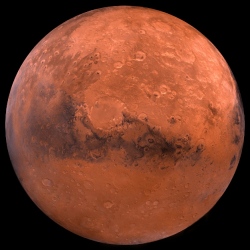
Water basins formed on Mars more than three billion years ago may have once been habitable, according to a new research paper which its authors say lends credibility to the theory that there was once life on the Red Planet. Scientists have been studying a region of Mars close to a massive volcanic plateau.
Groundwater circulation beneath the surface of this site may have helped to create some of the planet’s deepest basins, wrote scientists J. Alexis Palmero Rodriguez, Cathy Weitz and Thomas Plaz in a paper published in the journal Planetary Space and Science.
The researchers suggest the basins may have been alternately covered with lava and water over the course of hundreds of millions of years, creating the right balance of temperature ranges, water pressure and nutrients necessary to sustain life. Shallow lakes may have formed in these lava-covered basins within the last few tens of millions of years, they say.
"The temperature ranges, presence of liquid water, and nutrient availability, which characterize known habitable environments on Earth, have higher chances of forming on Mars in areas of long-lived water and volcanic processes," Rodriguez said in a news release.
Salt deposits and other features of the ancient lakes are of particular importance "when looking for past habitable areas on Mars," he added. If the site was, indeed, once habitable, the researchers say it probably would have been geographically similar to Tibet.
